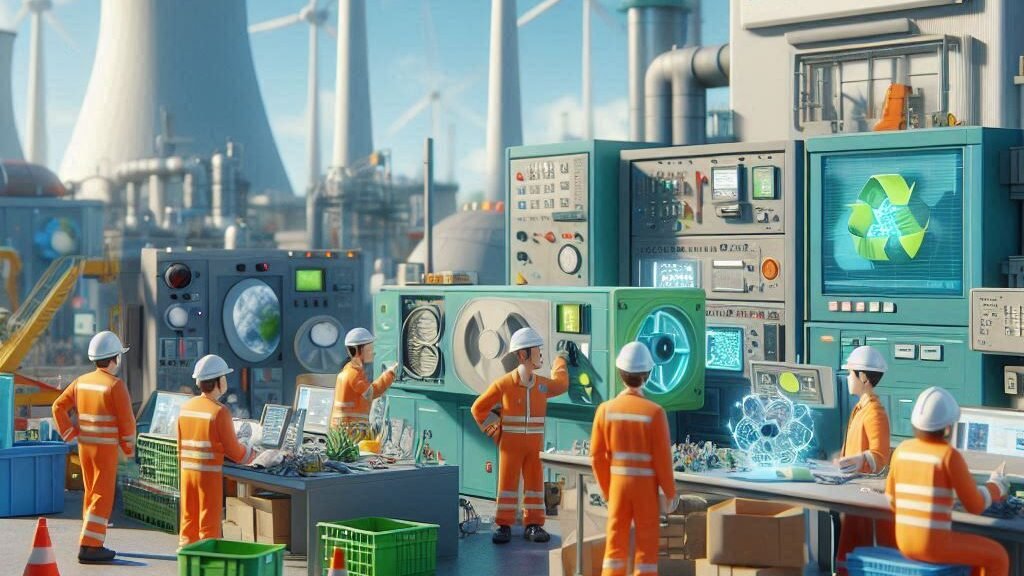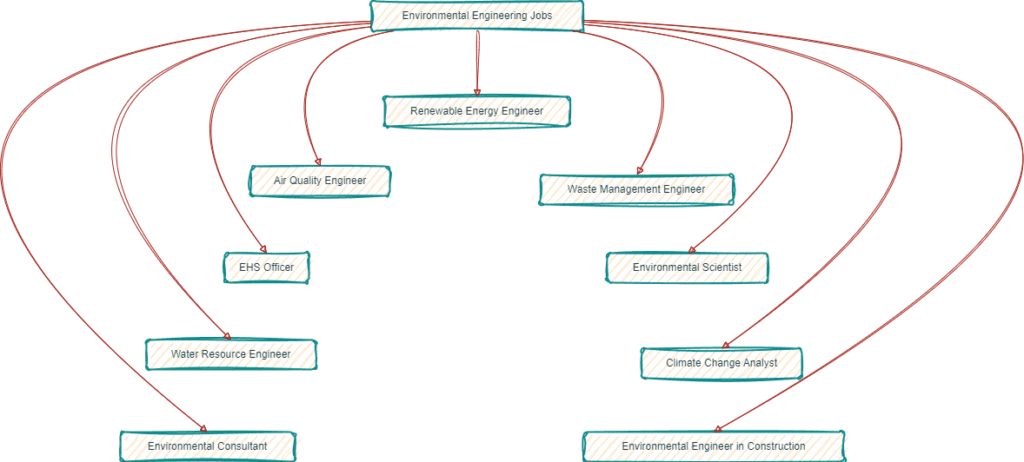The Best Country for Environmental Engineering Jobs: A Comprehensive Guide
Introduction
In today’s world, where environmental concerns are at the forefront of global discussions, the field of environmental engineering has gained significant importance. Environmental engineers play a crucial role in developing sustainable solutions to protect and preserve our planet. If you are considering a career in environmental engineering or looking for job opportunities in this field, it is essential to explore the best countries that offer promising prospects. In this comprehensive guide, we will delve into the top countries for environmental engineering jobs, highlighting their unique features, job market trends, and opportunities for growth.

1. United States
The United States is undoubtedly one of the leading countries for environmental engineering jobs. With its strong emphasis on technological advancements and environmental regulations, the U.S. offers a wide range of opportunities for environmental engineers. The country boasts numerous research institutions, government agencies, and private companies that actively seek professionals in this field. From designing sustainable infrastructure to managing waste and pollution, environmental engineers in the U.S. are at the forefront of innovation and sustainable development.

Key Factors:
- Robust job market with a high demand for environmental engineers.
- Well-established research institutions and universities.
- Strong government support for environmental initiatives.
- Opportunities for specialization in various subfields of environmental engineering.
Job Titles: Environmental Engineer, Water Resources Engineer, Air Quality Engineer, Sustainability Consultant.
Companies and Organizations: Environmental Protection Agency (EPA), National Aeronautics and Space Administration (NASA), U.S. Army Corps of Engineers, consulting firms (e.g., AECOM, CH2M), and research institutions (e.g., MIT, Stanford University).
Useful Resources:
- Environmental and Water Resources Institute (EWRI)
- American Academy of Environmental Engineers and Scientists (AAEES)
2. Germany
Germany has long been recognized as a global leader in environmental engineering and sustainability. The country’s commitment to renewable energy, waste management, and environmental conservation has created a thriving job market for environmental engineers. German companies are known for their innovative technologies and sustainable practices, making it an attractive destination for professionals in this field. Additionally, Germany offers excellent research opportunities and a well-developed infrastructure to support environmental engineering projects.

Key Factors:
- Strong focus on renewable energy and sustainable development.
- Well-established engineering and research institutions.
- High demand for professionals with expertise in waste management and renewable energy systems.
- Emphasis on environmental regulations and compliance.
Job Titles: Environmental Engineer, Renewable Energy Engineer, Waste Management Specialist, Sustainability Analyst.
Companies and Organizations: Fraunhofer Institute, Siemens, Volkswagen, BASF, consulting firms (e.g., Ramboll, ERM), and research institutions (e.g., Technical University of Munich, RWTH Aachen University).
Useful Resources:
- German Association for Water, Wastewater, and Waste (DWA)
- German Association for Environmental Management and Sustainability in Higher Education (VNU)
3. Canada
Canada is renowned for its vast natural landscapes and commitment to environmental stewardship. The country offers a favorable environment for environmental engineers, with its focus on sustainable resource management and conservation. Canadian cities are known for their high quality of life and excellent work-life balance, making it an attractive destination for professionals seeking a fulfilling career in environmental engineering.

Key Factors:
- Abundance of natural resources and diverse ecosystems.
- Strong emphasis on sustainable resource management and conservation.
- Growing demand for professionals in water and wastewater management.
- Opportunities for research and development in renewable energy.
Job Titles: Environmental Engineer, Water Resources Engineer, Ecological Consultant, Climate Change Analyst.
Companies and Organizations: Environment and Climate Change Canada, Ontario Ministry of the Environment, consulting firms (e.g., Golder Associates, Stantec), and research institutions (e.g., University of Toronto, University of British Columbia).
Useful Resources:
- Canadian Environmental Certification Approvals Board (CECAB)
- Canadian Society for Civil Engineering (CSCE)
4. Australia
Australia, known for its stunning landscapes and unique biodiversity, offers excellent opportunities for environmental engineers. The country places a strong emphasis on environmental conservation and sustainable development. With its vast coastline, Australia is particularly focused on coastal management and water resources. The job market for environmental engineers in Australia is robust, with a growing demand for professionals in environmental impact assessment, climate change adaptation, and renewable energy projects.

Key Factors:
- Diverse ecosystems and unique environmental challenges.
- High demand for professionals in coastal management and water resources.
- Emphasis on environmental impactassessment and climate change adaptation.
- Opportunities for research and innovation in renewable energy projects.
Job Titles: Environmental Engineer, Coastal Engineer, Water Resources Specialist, Climate Change Consultant.
Companies and Organizations: Commonwealth Scientific and Industrial Research Organisation (CSIRO), Australian Department of the Environment and Energy, consulting firms (e.g., GHD, Cardno), and research institutions (e.g., University of Melbourne, University of New South Wales).
Useful Resources:
5. Netherlands
The Netherlands, known for its innovative water management systems and sustainable urban planning, offers excellent opportunities for environmental engineers. With a significant portion of the country located below sea level, the Netherlands has become a global leader in flood protection and water infrastructure. Dutch companies and research institutions are at the forefront of sustainable technologies and solutions, making it an ideal destination for professionals in environmental engineering.

Key Factors:
- Innovative water management systems and sustainable urban planning.
- Strong focus on flood protection and water infrastructure.
- Opportunities for research and development in climate adaptation and circular economy.
- Well-developed cycling infrastructure and commitment to sustainable transportation.
Job Titles: Environmental Engineer, Water Management Engineer, Sustainable Urban Planner, Climate Adaptation Specialist.
Companies and Organizations: Deltares, Royal HaskoningDHV, Arcadis, Netherlands Environmental Assessment Agency, consulting firms (e.g., Witteveen+Bos, Sweco), and research institutions (e.g., Delft University of Technology, Wageningen University & Research).
Useful Resources:
Frequently Asked Questions (FAQ)
1. What qualifications do I need to work as an environmental engineer?
To work as an environmental engineer, you typically need a bachelor’s degree in environmental engineering or a related field. Some positions may require a master’s degree or specialized certifications, depending on the specific job requirements and country regulations.
2. Are there opportunities for career growth in environmental engineering?
Yes, there are ample opportunities for career growth in environmental engineering. As you gain experience and expertise, you can progress to higher-level positions such as project manager, senior engineer, or consultant. Continuous learning, staying updated with industry trends, and networking can also contribute to your career advancement.
3. How can I find job opportunities in environmental engineering?
There are several ways to find job opportunities in environmental engineering. You can search online job portals, company websites, and professional networking platforms. Additionally, attending career fairs, joining industry associations, and reaching out to recruitment agencies can also help you discover job openings in this field.
4. What skills are essential for success in environmental engineering?
Some essential skills for success in environmental engineering include strong analytical and problem-solving abilities, excellent communication and teamwork skills, knowledge of environmental regulations and policies, proficiency in relevant software and tools, and a passion for sustainability and environmental conservation.
5. How can I stay updated with the latest developments in environmental engineering?
To stay updated with the latest developments in environmental engineering, you can subscribe to industry publications, attend conferences and seminars, join professional associations, and participate in continuing education programs. Engaging in research projects and collaborating with experts in the field can also help you stay at the forefront of advancements in environmental engineering.
Conclusion
Choosing the right country for your environmental engineering career is a crucial decision that can significantly impact your professional growth and job satisfaction. The countries mentioned in this guide offer excellent opportunities for environmental engineers, each with its unique advantages and focus areas. Whether you aspire to work on cutting-edge research projects, contribute to sustainable infrastructure development, or tackle pressing environmental challenges, these countries provide a fertile ground for your ambitions. Remember to conduct thorough research, consider your personal preferences, and leverage the resources available to make an informed decision about your career path in environmental engineering.
Remember, the world needs passionate and dedicated environmental engineers like you to create a sustainable future. Good luck on your journey!


